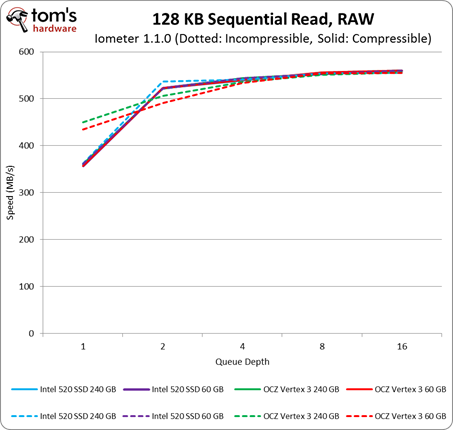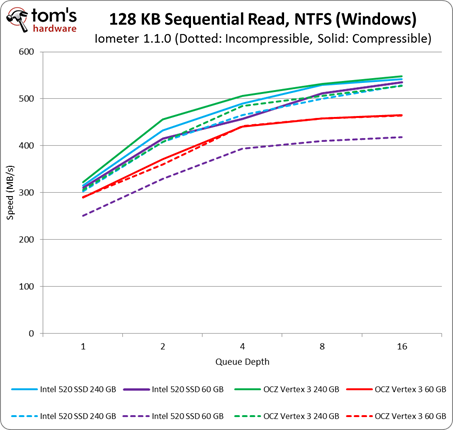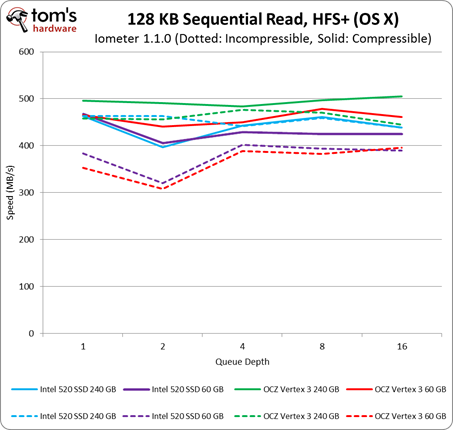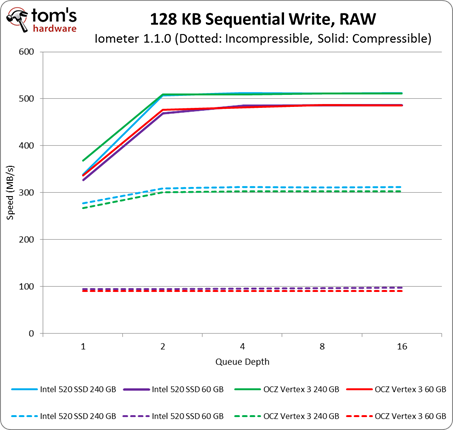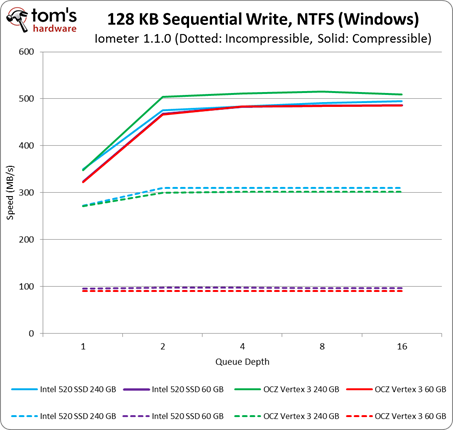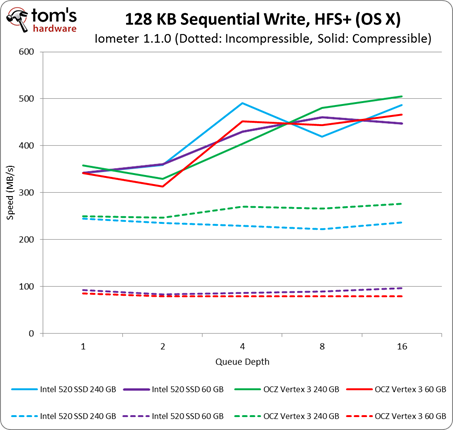Intel SSD 520 Review: Taking Back The High-End With SandForce
Incompressible Performance: SandForce's Weakness
The preceding page represented a best-case scenario for how SandForce's SF-2281 controller handles your information. Specifically, we know it handles compressible data very efficiently. But the company freely admits that it's not as deft when forced to address incompressible information. The cornerstone of its DuraClass engine centers on the premise that the majority of your desktop workload is, in fact, compressible. Nevertheless, there are still plenty of workloads that incorporate incompressible data.
Incompressible Sequential Read
Examples include copying/creating multimedia, archive manipulation, encryption, some gameplay, and video recording
In this specific scenario, OCZ's drive manage to move about 100 MB/s more than Intel's at a queue depth of one. At higher queue depths, that advantage disappears.
Our NTFS-formatted PC exhibits overhead we didn't see when we were testing the physical blocks. Performance starts in the 300 MB/s range and scales up from there. As we'd expect, the 60 GB drives tend to be a little slower than the 240 GB models.
The Mac behaves differently. This time, performance at low queue depths is higher. The lower-capacity 60 GB drives take more of a hit than the 240 GB drives, though. Interestingly, this is one occasion where the 60 GB SSD 520 outperforms OCZ's 60 GB Vertex 3.
Incompressible Sequential Write Performance
Get Tom's Hardware's best news and in-depth reviews, straight to your inbox.
Examples include copying/creating multimedia, archive manipulation, encryption, some gameplay, and video recording
Writing incompressible data sequentially is more of a challenge than reading. Intel establishes a small, yet quantifiable advantage in this discipline. Its SSD 520s consistently outperform the Vertex 3s by 5-8 MB/s, and this modest delta translates to the Mac and PC tests below.
Current page: Incompressible Performance: SandForce's Weakness
Prev Page 128 KB Sequential Performance: Raw, Windows, And Mac Next Page Tom's Hardware Storage Bench And PCMark 7-
phamhlam I love Intel SSD. 128GB for about $210 isn't bad. It is just hard to not chose something like a Corsair GT 120GB that cost $150 with rebate over this. I would always put a Intel SSD in a computer for novice since it is reliable.Reply -
jaquith Nice article :)Reply
Just need more SSD's to compare, I'd like to see similar tests done with 120GB...180GB...256GB and several more brands. Further, as I mentioned before in the other article please list the exact model numbers and OEM specs including their 4KB IOPS; otherwise folks don't understand the results and if relying on this a purchasing will have in many cases a 4 in 5 chance of selecting the wrong SSD.
Prior article - http://www.tomshardware.com/reviews/sata-6gbps-performance-sata-3gbps,3110.html -
theuniquegamer costly but i think reliability comes at a price. These ssds are best for enterprises . If the price will be little lower then the common user can afford these and get a good reliable ssd.Reply -
bildo123 "Measuring boot time is one of the best illustrations of how an SSD benefits your computing experience." Be that as it may I find it almost irrelevant seeing as I hardly ever boot my computer, perhaps 2-3 times a month if that. Getting out of standby on my HDD is a matter of seconds.Reply -
danraies These prices are lower than I thought. $20-$40 extra (depending on the comparison) for peace-of-mind is not outrageous.Reply -
acku carn1xHmmm, maybe I missed a good excuse, but I'd like to see the Octane in these tests.Reply
We didn't have the Octane on hand in the 256 GB capacity, but we'll be sure to make that side by side comparison down the road.
phamhlamI love Intel SSD. 128GB for about $210 isn't bad. It is just hard to not chose something like a Corsair GT 120GB that cost $150 with rebate over this. I would always put a Intel SSD in a computer for novice since it is reliable.
Excellent point. Price is always a fickle thing.
thessdreviewNice Review!Thanks Les. :)
jaquithNice article Just need more SSD's to compare, I'd like to see similar tests done with 120GB...180GB...256GB and several more brands. Further, as I mentioned before in the other article please list the exact model numbers and OEM specs including their 4KB IOPS; otherwise folks don't understand the results and if relying on this a purchasing will have in many cases a 4 in 5 chance of selecting the wrong SSD. Prior article - http://www.tomshardware.com/review ,3110.html
We'll keep that mind for future reviews. However, we already list model and firmware on the test page.
Cheers,
Andrew Ku
TomsHardware.com
-
willard bildo123Getting out of standby on my HDD is a matter of seconds.And with an SSD, your computer comes out of standby faster than your monitors do. Not kidding.Reply -
mrkdilkington Anyone else disappointed Intel isn't producing their own high end chipset? Been waiting to upgrade my X25-M for a while now (Intel 320 isn't a big upgrade) but might just go with Samsung.Reply
